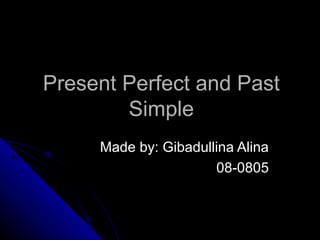
учебник0805
- 1. Present Perfect and Past Simple Made by: Gibadullina Alina 08-0805
- 2. Содержание Теория Вопросы по теории Упражнения Контрольная работа Ответы Исторический комментарий Интернет источники
- 3. Теория Present Perfect — это не прошедшее, а настоящее время. С его помощью всегда дается какая-то информация о настоящем. Если мы говорим о настоящем, о результате для настоящего, а не о прошлом, то нужно использовать Present Perfect. А если речь идет именно о прошлом, о том, что уже прошло, что завершилось в прошлом, то нужно применять Past Indefinite! Существуют два ключа к пониманию времени Present Perfect. Первый — связь с настоящим, а второй — важность результата действия для настоящего, а не времени совершения действия в прошлом. Present Perfect Связь с настоящим, Важен результат для настоящего; а когда произошло действие, неважно Признаками Present Perfect являются слова: never (никогда), ever (когда- либо), often (часто), just(только что), already (уже), yet (еще), always (всегда), seldom (редко) и т.д. Past Indefinite Нет связи с настоящим; действие полностью относится к прошлому Важно время совершения действия в прошлом Признаками являются cлова: yesterday (вчера), last week (на прошлой неделе), last month (в прошлом месяце), last year (в прошлом году) и т.д.
- 4. Present Perfect образуется при помощи вспомогательного глагола to have/has и третьей формы смыслового глагола (past participle). Третья форма правильных глаголов образуется с помощью окончания –ed (-) (I, he, she, it, you, we, they) + have/has not done (?) Have I/we/they/you, has he/she/it + done? Yes, I/We/They/You, he/She/It + have/has done Примеры I’ve seen this movie. — Я видел этот фильм. Т.е. я видел этот фильм вообще, неважно когда. Важен только результат для настоящего. Mike has travelled a lot. — Майк много путешествовал. Майк много путешествовал вообще, неизвестно когда. Past Simple: Подлежащее + сказуемое ( с окончанием –ed или 2 форма, если глагол неправильный). (+) (I, he, she, it, you, we, they) + Ved/V2 (-) (I, he, she, it, you, we, they) + did not (didn't) + V0 (?) WH + Did + (I, he, she, it, you, we, they) + V0 Yes, (I, he, she, it, you, we, they) did. Примеры We lived in Kiev until 1985. — Мы жили в Киеве до 1985 года. Т.е. мы жили до 1985 года, и больше не живем. Действие полностью относится к прошлому.
- 5. Вопросы по теории 1. What is the Present Perfect? 2. What is the Past Simple? 3. Which is formed by Present Perfect and Past Simple? 4. Which forms of the verb in Present Perfect and Past Simple tenses? 5. Which expressions are used to denote the Present Simple?
- 6. Упражнения Упражнение№ 1. Раскройте скобки. 1. John (write) his name. 2. I (draw) a picture. 3. Tom (blow out ) the light. 4. The cat (drink) its milk. 5. The tree (fall) across the road. 6. John (give) his bicycle to his brother. 7. You (make) a mistake. 8. We (eat) our dinner. 9. The train just (go). 10. I just (tell) the answer. 11. George never (be) in Australia. 12. John and Richard just (go away). 13. The baker (sell) all his cakes. 14. I (read) this book.
- 7. Упражнение№ 2.Перепишите следующий текст в прошедшем времени. On Monday we have five lessons. The first lesson is Russian. At this lesson we write a dictation and do some exercises. Nick goes to the blackboard. He answers well and gets a "five". Pete does not get a "five" because he does not know his lesson. After the second lesson I go to the canteen. I eat a sandwich and drink a cup of tea. I do not drink milk. After school I do not go home at once. I go to the library and take a book. Then I go home.
- 8. Контрольная работа Put the verbs in the Present Perfect or Past Simple. 1. Anthony Trollope ___(travel) to South Africa, Australia, Egypt, and the West Indies. Joanna Trollope___ (travel) to many parts of the world. 2. She___ (win) many awards, and several of her stories____ (appear) on TV. 3. Her first book____ (come) out in 1980. Since then, she____ (sell) more than 5 million copies. 4. She____ (go) to school in the south of England, and ____(study) English at Oxford University, but she ____ (live) in the country for most of her life. 5. She writes her books by hand. She____ (have) the same pen since 1995.
- 9. Ответы 1.Has traveled/traveled 2.Has won/appeared 3.Come/has sold 4.Has gone/studied/lived 5.Has has.
- 11. Интернет источники Теория Упражнения Исторический комментарий